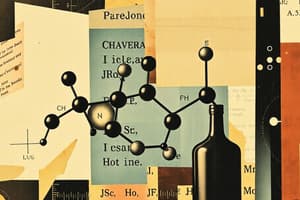Podcast
Questions and Answers
Which characteristic of benzene explains its lower reactivity compared to typical alkenes?
Which characteristic of benzene explains its lower reactivity compared to typical alkenes?
- The presence of fewer carbon atoms in its structure.
- Its unique stability arising from its aromatic nature, making it less prone to addition, oxidation, or reduction. (correct)
- Its cyclic structure, which prevents it from undergoing addition reactions.
- Its saturated nature due to single bonds between all carbon atoms.
Benzene, with its formula $C_6H_6$, appears to be highly unsaturated. What observation contradicts this expectation?
Benzene, with its formula $C_6H_6$, appears to be highly unsaturated. What observation contradicts this expectation?
- Benzene readily undergoes oxidation reactions, similar to alkenes.
- Benzene is easily reduced to cyclohexane in the presence of a catalyst.
- Benzene quickly decolorizes bromine water, indicating unsaturation.
- Benzene does not typically undergo addition reactions like alkenes. (correct)
Michael Faraday's work with the oily residue from illuminating gas production led to what significant discovery?
Michael Faraday's work with the oily residue from illuminating gas production led to what significant discovery?
- The synthesis of the first polymer.
- The development of a new method for producing illuminating gas.
- The isolation and identification of benzene. (correct)
- The discovery of the first aliphatic hydrocarbon.
Why are aromatic compounds also referred to as arenes?
Why are aromatic compounds also referred to as arenes?
If benzene were to react like a typical alkene, which type of reaction would be most expected?
If benzene were to react like a typical alkene, which type of reaction would be most expected?
Flashcards
What is Benzene?
What is Benzene?
A compound first isolated by Michael Faraday in 1825 from oily residue.
What is the molecular formula of Benzene?
What is the molecular formula of Benzene?
C6H6
What are Aromatic compounds (Arenes)?
What are Aromatic compounds (Arenes)?
Organic compounds that are highly unsaturated but stable.
What makes Benzene unreactive?
What makes Benzene unreactive?
Signup and view all the flashcards
What are Aromatic Compounds?
What are Aromatic Compounds?
Signup and view all the flashcards
Study Notes
- Benzene was first isolated and identified by Michael Faraday in 1825.
- It was derived from the oily residue from the production of illuminating gas.
- The chemical formula for benzene is C6H6.
- Benzene appears unsaturated, but it is very unreactive.
- Benzene does not undergo addition, oxidation, or reduction reactions.
- These reactions would be characteristic of alkenes.
- Aromatic compounds are also known as arenes.
- Aromatic compounds are highly unsaturated.
- These compounds are very stable toward reagents that react with alkenes.
Studying That Suits You
Use AI to generate personalized quizzes and flashcards to suit your learning preferences.




